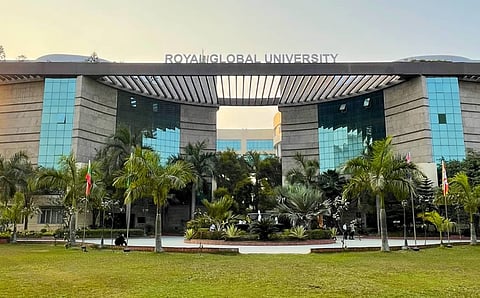
- Home
- Live Blog
- Breaking News
- Top Headlines
- Cities
- NE News
- Sentinel Media
- Sports
- Education
- Jobs

Guwahati, April 9, 2025 — The Center for South Asia, Southeast Asia and Act-East Studies at Royal Global University convened a high-impact event on April 8, 2025, titled “Strengthening India-Bhutan Cross-Border Trade, Infrastructure, and Energy Cooperation.” The event marked a major step forward in promoting policy dialogue, regional understanding, and stakeholder collaboration on issues central to India-Bhutan relations.
The session was spearheaded by Prof. Swabera Islam, Chairperson of the Center, who has been instrumental in shaping its vision and forging linkages between academia and policy communities. Under her leadership, the Center has emerged as a vital platform for addressing regional connectivity, energy cooperation, and sustainable development through research-driven and multi-sectoral engagements.
Keynote speaker Salijay Roy Baruah, a retired Indian Revenue Service (IRS) officer, who held important positions across major Custom Houses in India—including Delhi, Kolkata, Chennai, and Mumbai—brought decades of institutional insight into the discussion. Having also served on central deputation in various key ministries and played a pivotal role in modernizing customs procedures, his intervention highlighted the strategic and operational frameworks underpinning India-Bhutan trade relations. His address offered a detailed overview of the India-Bhutan Trade, Commerce and Transit Agreement, emphasizing its foundational role in enabling duty-free trade, currency parity, and seamless movement of goods through designated Land Customs Stations such as Darranga, Kamardwisa, and Hatisar in Assam. He also emphasized the growing scope for Assam-based entrepreneurs to tap into trade opportunities with Bhutan, facilitated by duty-free access and a currency exchange regime that ensures parity between the Indian Rupee and the Bhutanese Ngultrum.
Prof. Debajit Palit, Centre Head at the Centre for Climate Change and Energy Transition, Chintan Research Foundation, spoke on Bhutan’s evolving energy mix. He noted that while hydropower continues to dominate Bhutan’s exports, the country is now integrating solar and wind power into its strategy, including plans for 1.2 GW of utility-scale solar capacity. He highlighted the potential for Bhutan to contribute to India’s clean energy transition through initiatives such as pumped hydro storage and cross-border electricity trade via India's "One Nation One Grid."
Dr. Hriday Sarma, Guwahati-based Advocate and founding team member of ASEAN Bridge, presented a regional lens in his talk, “Bhutan-Assam Trade: Opportunities and Challenges in a Wider South and Southeast Asian Context.” He emphasized the need to align subnational trade efforts with broader BBIN and ASEAN frameworks, especially through improved logistics, harmonized regulations, and people-centric economic models. Dr. Sarma also moderated the session, fostering a vibrant discussion across institutional and disciplinary lines.
A standout theme unanimously highlighted by all speakers was the transformational potential of the Gelephu Mindfulness City, a proposed eco-urban center in southern Bhutan near the Assam border. Described as a future Net Zero City, Gelephu could become a launchpad for green energy integration, digital infrastructure, tourism, and sustainable manufacturing. With its proximity to Assam and its focus on clean development, the city presents a unique opportunity for cross-border collaboration in sectors like eco-tourism, IT services, data centers, organic farming, and renewable energy solutions.
Speakers noted that Gelephu’s development could catalyze a new wave of cross-border businesses, particularly benefiting Assam’s entrepreneurs and MSMEs who are well-placed to supply goods, services, and human capital to the emerging economic zone.
The event saw active participation from students and faculty from the departments of economics, political science, and social work, generating a spirited dialogue on sustainable development, regional connectivity, and energy diplomacy.
Looking ahead, the Center announced plans to host a series of follow-up forums focused on cross-border trade facilitation, energy collaboration, and regional economic corridors, with an emphasis on multi-stakeholder engagement involving governments, academia, industry, and civil society.
As articulated by Prof. Islam in her closing remarks, “We envision the Center as a bridge—between nations, institutions, and communities—enabling pragmatic conversations and collaborative ventures that shape a more connected and sustainable region.”
ALSO WATCH